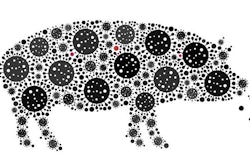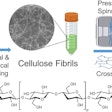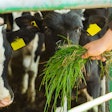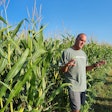
Speaking at the National Grain and Feed Association’s annual convention, David MacLennan said agriculture must be more ‘sustainably oriented’
Sustainability and regenerative agriculture practices are crucial to the future of the world’s food supply, according to Cargill CEO David MacLennan, who spoke at the National Grain and Feed Association’s recent annual convention.
“I think the greatest challenge facing the ag industry today is sustainably feeding a world that is growing rapidly in population,” MacLennan said. “We’re soon going to pass through 8 billion people on the planet. They need to eat. They want access to better food, and we need to do it sustainably. We need to figure out, how can we feed a growing planet but use more sustainably oriented agriculture practices.”
Critics of agriculture systems say ag producers are creating problems, such as greenhouse gas emissions, deforestation and soil erosion, but MacLennan said producers are part of the solution.
“There are many that criticize agriculture for its impact, for being part of the problem. I say it’s part of the solution,” he said. “Ag is how we can produce food more sustainably with less water usage, with better focus on soil health. And ag is how we can find a way forward.”
The real threat, he added, is inaction on sustainable practices, and regenerative agriculture is the way forward.
“Inaction is not an alternative. That’s a threat to sustainability. So, we have to do something. We have to be proactive. We need to build solutions for the future. Nobody knows that better than farmers,” he said. “Regenerative ag is a great tool that our farmers can use in order to be more sustainable as an industry.”
Regenerative agriculture is a combination of farming techniques that focuses on conservation and rehabilitation. Practices include, but are not limited to, well-managed grazing, no-till farming, cover crops, crop rotation, composting, support for pollinator habitats and ecological aquaculture, all of which can be implemented on large- or small-scale farms.
Heroes of the pandemic
MacLennan also hailed the agriculture industry as the heroes of the COVID-19 pandemic, and said the industry learned valuable lessons from the past year.
“A couple of the lessons that the ag industry has learned is that our farmers are heroes,” he said. “Our food workers, our ag workers, they stepped up. When the world was shutting down in early 2020, and there was a lot of fear – where’s our food going to come from, how are we going to make sure it gets to the tables and the stores and the restaurants where people can consume it – our farmers stepped up. They are the heroes of COVID-19 and it showed us how resilient the food supply system is and what we need in terms of courage and vision in order to make sure that the ag supply, the food supply system continues to work despite intense strain.”
And, MacLennan added, while the industry faced tough times, the food supply chain showed its resiliency.
“Another lesson we learned is, we can do big things. And it’s a good lesson, that we need to dream big, we need to think about, how can we get through tough times,” he said. “But the fact of the matter is, the food supply chain was there. We kept food moving, we kept it getting to where it was needed, and the resilience of the food an ag supply system was really amazing. We did do big things and we’re going to continue to do big things, and Cargill believes we can dream bigger as an industry and help solve sustainability, regenerative ag, and continue to do the right things for the planet.”


















